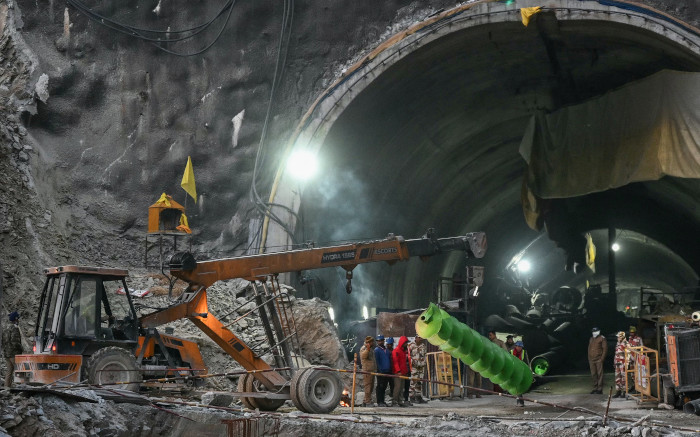
Indian stocks suffered their biggest intraday decline since March 2020 and foreign investors sold more than ever as vote counting trends in the general election suggested that Prime Minister Narendra Modi’s alliance unlikely that the overwhelming majority predicted by post-election polls.
With more than half of the votes counted on Tuesday, it seemed unlikely that Modi's Bharatiya Janata Party (BJP) would be able to win a majority in the 543-member lower house on its own. It will probably have to rely on allies in the National Democratic Alliance (NDA) to form a government.
This could lead to some uncertainty about economic policies, such as pushing for investment-led growth, which is the cornerstone of the Modi government. The Indian economy grew by 8.2 percent in the fiscal year to March 2024.
“The key question is whether the BJP can maintain its single-party majority,” said Ken Peng, head of Asia investment strategy at Citi Global Wealth. “If not, would its coalition be able to deliver economic development, particularly infrastructure?”
The NSE Nifty 50 index closed down at 21,884.5 points and the S&P BSE Sensex fell 5.74 percent to 72,079.05. The indices fell as much as 8.5 percent earlier in the day after hitting record highs on Monday.
At the day's low, the indices recorded their biggest intraday decline since March 2020, when stocks were hit hard by the first lockdown during the COVID-19 pandemic.
“Due to its dependence on coalition partners, the incoming NDA government may shift its focus to a welfare-led approach in the July budget rather than focusing on reforms,” said Puneet Sharma, CEO and fund manager at Whitespace Alpha.
Indian markets are now likely to weaken due to a higher risk perception, said analysts at brokerage Emkay Global. The firm believes difficult reforms such as changes in land and labor policies and the privatization of state-owned enterprises are “off the table.”
Post-election polls had predicted a clear victory for Modi's NDA over the weekend, catapulting markets to all-time highs on Monday as investors were buoyed by expectations of continued economic growth.
“Political continuity”
By the close of trading on Monday, the value of the benchmark indices had more than tripled since Modi took office as prime minister in May 2014.
Foreign investors, who invested a net $20.7 billion in Indian equities last year but pulled out before the election, were widely expected to switch buyers if the Modi alliance won a decisive victory.
Foreign institutional investors (FIIs) sold Indian equities worth 124.36 billion rupees (about $1.5 billion) on Tuesday, a record high, according to provisional data released Tuesday evening.
They had bought shares worth a net 68.51 billion rupees ($824.4 million) on Monday.
“From our perspective, it is important that the NDA returns to form the next government, which represents political continuity,” said Mike Sell, head of global emerging market equities at Alquity in London.
“Whether they win by 20 or 120 votes will have an impact on the extent of structural reforms that can be undertaken, but ultimately a win is a win and the growing positive sentiment about India's structural growth story will continue unabated.”
Amid uncertainty over the NDA's victory, intraday volatility in the stock index rose to its highest level in 26 months.
Traders said selling by high-frequency traders accelerated the decline and the sharp drop triggered margin calls.
The market is currently experiencing a significant correction due to margin calls as retail investors hold highly leveraged positions, said Rupak De, senior technical analyst at LKP Securities.
Some investors viewed the decline as a buying opportunity.
“Regardless of the final election outcome, the Indian economy will continue to benefit from longer-term tailwinds from favorable population demographics and ongoing geopolitical tensions between China and the United States,” said Gary Tan, portfolio manager at Allspring Global Investments.
Investors expect the Modi government to continue to focus on turning the country into a manufacturing hub – a project that has wooed foreign companies such as Apple and Tesla to set up production while Diversification beyond China.
The rupee closed at 83.53 against the US dollar, down 0.5 percent on the day and the biggest intraday fall in 16 months. The yield on the benchmark 10-year bond rose 10 basis points on the day, the biggest intraday rise in eight months, to end at 7.03 percent.






Recent Comments